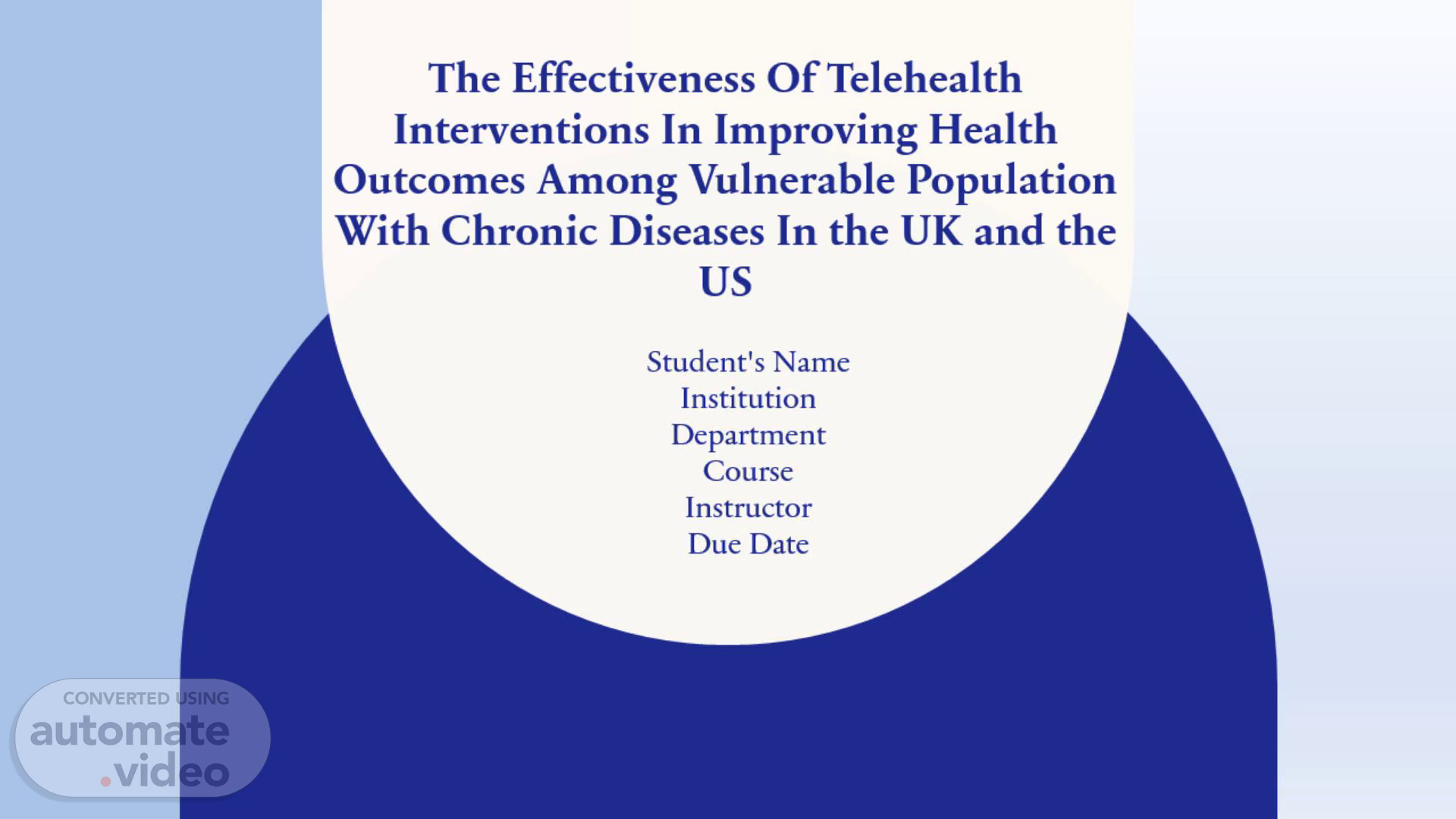
Page 1 (0s)
The Effectiveness Of Telehealth Interventions In Improving Health Outcomes Among Vulnerable Population With Chronic Diseases In the UK and the US.
Page 2 (10s)
Topic Overview. My topic for systematic analysis is The Effectiveness Of Telehealth Interventions In Improving Health Outcomes Among Vulnerable Population With Chronic Diseases in developed world, focusing in the UK and USA. Chronic illnesses disproportionately affect patients who primarily depend on traditional healthcare delivery services. Telehealth and electronic tools presenting an opportunity to improve medication adherence, reduce the cost of managing chronic illnesses, and incorporate individualised treatment approaches among the elderly patients with chronic illnesses..
Page 3 (32s)
Problem Faced by Vulnerable People with Chronic Illnesses.
Page 4 (49s)
Telehealth as the Solution. Specific telehealth systems such as follow-up videos or calls, remote monitoring devices, and phone applications can increase medication adherence and self-monitoring among patients with chronic illnesses (4). Telehealth enables continuous patient monitoring, self-management support, better adherence to treatment plans, and patient empowerment and independence (3)..
Page 5 (1m 7s)
Aim. Assess telehealth's effectiveness in improving clinical outcomes among elderly patients with diabetes, hypertension, and cardiovascular diseases. To analyse telehealth interventions and their impact on improving diabetes, hypertension, and cardiovascular outcomes..
Page 6 (1m 20s)
Research Questions/Objectives. To explore the benefits of managing diabetes, hypertension, and cardiovascular among the elderly using telehealth compared to face-to-face intervention. To assess the barriers and enablers of telehealth utilisation among the elderly population with diabetes, hypertension, and cardiovascular diseases..
Page 7 (1m 35s)
Design. This study will employ a systematic qualitative review methodology. The benefits of this design include: Comprehensive Overview of data from multiple sources. Rigor and Transparency – critically appraise studies Identifying Patterns and Themes. Evidence Synthesis..
Page 8 (1m 49s)
Data Sources. The preferred strategy is electronic search, using the Google search engine. Specific keywords include “telehealth and vulnerable or old people” and “telehealth and management of chronic disease or diabetics, hypertension.” Academic data sources - Bibliographic databases I will use include MEDLINE, PsycINFO, and Cumulative Index to Nursing and Allied Health (CINAHL)..
Page 9 (2m 6s)
Inclusion and Exclusion Criteria of Studies. Inclusion Studies using participants/patients aged (40-70). Studies assessing telehealth devices in managing chronic illnesses. Studies where participants have diabetes, hypertension, and cardiovascular diseases. Studies done in primary care, community-based, and specialist or secondary settings. Studies measuring patients’ quality of life during telehealth treatment..
Page 10 (2m 29s)
Data Extraction. A standardized data extraction form will be used Extracted data will contain. Study characteristics. Methodology. Key findings. Quality assessment..
Page 11 (2m 40s)
Plan for Data Analysis. Thematic data analysis will be used. It will include a detailed synthesis of findings on the telehealth intervention (type, content, delivery format, and duration), target population characteristics, type of outcome measures, and overall quality of evidence. Thematic analysis will also focus on subgroups or subsets such as participants and types of interventions..
Page 12 (2m 58s)
Plan for Critical Appraisal. The preferred tool for critical appraisal is the rapid critical appraisal (RCA) checklist developed by Melnyk and Fineout (7). The RCA will involve evaluating the relevance of studies based on validity, reliability, and applicability to clinical practice. Although there are different RCA tools, most focus on three questions: the validity of a study's results, the importance of results, and whether the results answer the research question..
Page 13 (3m 19s)
Ethical Reflection. Ethical considerations for conducting systematic or literature reviews are different from primary studies where researcher collect sensitive and confidential data from participants. Three guiding principles for quality systematic reviews are: Informed reflexivity and subjectivity. Informed selective inclusivity. Audience-appropriate transparency..
Page 14 (3m 34s)
Reference List. Bernell S, Howard SW. Use your words carefully: what is a chronic disease?. Frontiers in public health. 2016 Aug 2;4:212747. Available at https://doi.org/10.3389/fpubh.2016.00159 Accessed on: 09.04.2024] Bruno W, Haar RJ. A systematic literature review of the ethics of conducting Research in the humanitarian setting. Conflict and health. 2020 Dec; 14:1-7. Available at https://doi.org/10.1186/s13031-020-00282-0 [Accessed on: 10.04.2024] Choi NG, DiNitto DM, Marti CN, Choi BY. Telehealth use among older adults during COVID-19: Associations with sociodemographic and health characteristics, technology device ownership, and technology learning. Journal of Applied Gerontology. 2022 Mar;41(3):600-9. Available at https://doi.org/10.1177/07334648211047347 [Accessed on: 10.04.2024] Corbett JA, Opladen JM, Bisognano JD. Telemedicine can revolutionize the treatment of chronic disease. International Journal of Cardiology Hypertension. 2020 Dec;7. Available at https://doi.org/10.1016/j.ijchy.2020.100051 [Accessed on: 09.04.2024] Fadah K, Hechanova A, Mukherjee D. Epidemiology, pathophysiology, and management of coronary artery disease in the elderly. International Journal of Angiology. 2022 Dec;31(04):244-50. Available at https://doi.org/10.1055/s-0042-1751234 [Accessed on: 10.04.2024] Haile ZT. Critical appraisal tools and reporting guidelines. Journal of Human Lactation. 2022 Feb;38(1):21-7. Available at https://doi.org/10.1177/08903344211058374 [Accessed on: 09.04.2024] Melnyk B. M., Fineout-Overholt E. (2015). Evidence-based practice in nursing & healthcare: A guide to best practice (3rd ed.). Wolters Kluwer. [Accessed on: 12.04.2024] Suri H. Ethical considerations of conducting systematic reviews in educational Research. Systematic reviews in educational Research: Methodology, perspectives and application. 2020:41-54. Available at https://doi.org/10.1007/978-3-658-27602-7_3 [Accessed on: 11.04.2024].